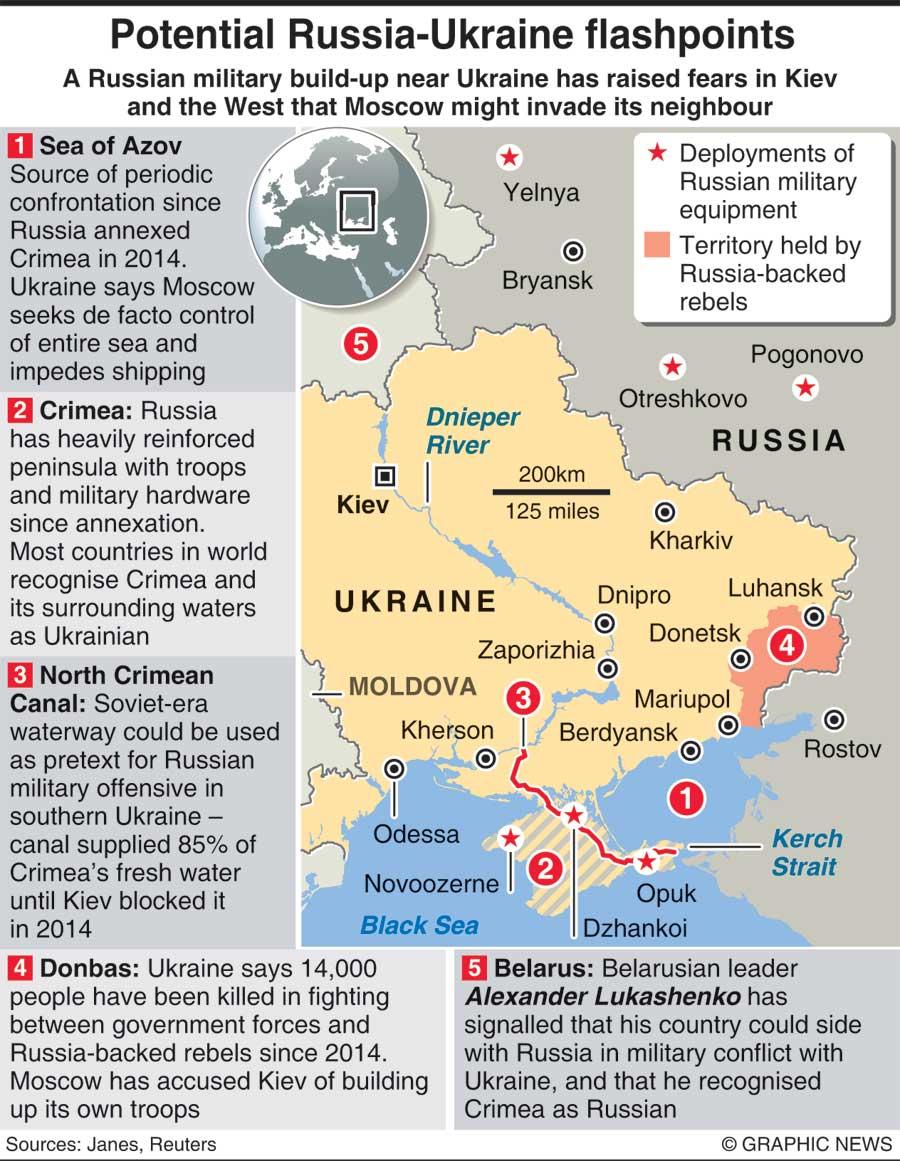Reply To:
Name - Reply Comment
Despite its many shortcomings, the 2015 agreement, signed in Belarus’ capital Minsk, was seen to be maintaining at least an appearance of peace on the Russia-Ukraine border. Suddenly, the situation changed last month, with Russia amassing troops on the border, indicating preparation for an invasion. The reason: According to Moscow, the North Atlantic Treaty Organisation (Nato) is continuing its eastward expansion, deliberately disregarding Russia’s security concerns.
at least an appearance of peace on the Russia-Ukraine border. Suddenly, the situation changed last month, with Russia amassing troops on the border, indicating preparation for an invasion. The reason: According to Moscow, the North Atlantic Treaty Organisation (Nato) is continuing its eastward expansion, deliberately disregarding Russia’s security concerns.
Russia’s President Vladimir Putin has denied that the troop deployment was linked to an invasion plan, but is seeking a Nato pledge that it will not enroll Ukraine as a member or deploy troops or advanced weapons in Ukraine. Either move, Putin said, would be a red line for Moscow. But in Russia’s aggressive foreign policy stance, Ukraine’s right as a sovereign nation to decide for itself what it wants is not recognised. This is a form of intervention in the internal affair of Ukraine.
In a recent remark, Putin said: “The threat on our western borders is … rising, as we have said multiple times. … In our dialogue with the United States and its allies, we will insist on developing concrete agreements prohibiting any further eastward expansion of NATO and the placement there of weapons systems in the immediate vicinity of Russian territory.”
Pat Buchanan, a political advisor to three US presidents, in a recent article interpreted Putin’s statements as: “Thus far and no further! Ukraine is not going to be a member of NATO or a military ally and partner of the United States, nor a base for weapons that can strike Russia in minutes. For us, that crosses a red line. And if NATO proceeds with arming Ukraine for conflict with Russia, we reserve the right to act first. Finlandise Ukraine, or we will!”
On Wednesday, Russia delivered to the US its proposals for legal security guarantees over Nato’s expansion after President Putin said he wanted talks to start immediately.
Russia’s Deputy Foreign Minister Sergei Ryabkov discussed with US assistant Secretary of State Karen Donfried Moscow’s insistence to spell out in writing that NATO would halt its eastward expansion. The US is yet to respond, although Ukraine anticipates a Russian invasion in a matter of weeks.
"The US failure to recognise Russia’s security concerns in its backyard was a costly diplomatic mistake. Moscow had believed that Washington would reciprocate Russia’s policy of not messing around in areas where the US had genuine security concerns. This was an unwritten understanding"
In 2014-2015, too, the situation was similar: It was all about Nato’s eastward expansion. The crisis led to Russia invading Ukraine in support of separatist movements in Eastern Ukraine and then annexing Crimea. These events unfolded after a West-instigated regime change revolution that overthrew Ukraine’s pro-Russian President Viktor Yanukovych. In 2008, against the backdrop of moves by Nato to enroll Georgia as a member, Russia invaded that country and succeeded in carving out two separate states from it -- South Ossetia and Abkhazia.
For a decade or so, after the Soviet Union’s collapse following its Cold War defeat in 1991, Nato had kept snubbing Russia’s overtures to join the alliance. Later, relations continued to sour due to Nato’s unilateral military action against Russia’s ally Serbia during the Balkan war in 1999, the US invasion of Iraq in 2003, Nato’s offer of membership to Georgia and Ukraine and the United States’ unilateral withdrawal of cold war era missile treaties. This was while Russia became an authoritarian state.
With Russia becoming economically stable, thanks to the rise in oil prices in the 2000s, President Putin launched an ambitious drive to regain the awe Russia had commanded during the Cold War era as the de facto mother country within the Soviet Union.
As a result, from a military point of view, the current world order is dominated by three powers --the US-led Nato, Russia and China -- although it is still premature to call it a tripolar order.
Any US-Russia military confrontation over Ukraine is unlikely, for nuclear powers do not go to war with each other. However, in the unlikely event of a US-Russia war breaking out over Ukraine, it may be a welcome development for China. Most likely, China will make a military move to annex Taiwan, benefiting from the US military exhaustion in Eastern Europe.
Although the US is supposed to defend Taiwan, the assurance is not ironclad, say some US analysts who posit that Washington will not get involved in a direct military confrontation with China. Such politically realistic views are being heard loud these days as China continues its provocative military manoeuvres and exercises in the Taiwan Strait. These Chinese war games take place while the US suffers a credibility crisis after it sent a wrong signal to allies through it hasty Afghanistan withdrawal which saw it abandoning the pro-US government in the face of the Taliban advance.
However, despite the nuclear deterrence preventing big power conflicts, the present Ukrainian crisis is, in a way, a world war movement with eerie resemblances to the events that led to World War II. Just as Russia has amassed troops on the border with Ukraine, Adolf Hitler’s Nazi Germany in 1939 had amassed troops in preparation for an invasion of Poland. Just as there existed a guarantee from France and Britain for Poland in the event of a military attack from Germany, today Nato and European Union are vowing to defend Ukraine if it comes under a Russian attack.
Although after his telephone conversation with Putin, US President Joe Biden has taken the war option off the table, some US hawks are urging the President not to backtrack in his resolve to defend Ukraine even it means the use of nuclear weapons.
The US failure to recognise Russia’s security concerns in its backyard was a costly diplomatic mistake. Moscow had believed that Washington would reciprocate Russia’s policy of not messing around in areas where the US had genuine security concerns. This was an unwritten understanding. In its neighbourhood, the US does not permit a rival military power to make its presence felt. The policy is called the Monroe Doctrine, named after President James Monroe. He articulated the doctrine in 1823. It was this policy that prompted the US to oppose the Soviet Union’s missile deployment in Cuba in 1962 even if it meant a global nuclear war.
Similarly, Russia does not tolerate a rival’s military presence in its immediate backyard in Eastern Europe and its southern belly, Central Asia. In the same way, China has drawn its nine-dash line in the South China Sea and is pursuing its assertive diplomacy to keep rival powers out of the area.
At a time when nations are reeling under the COVID-19 pandemic and an attendant economic recession that has brought about catastrophic consequences in countries like Sri Lanka, a war on global scale will lead to genocide of apocalyptic proportions. During the 2014-2015 Ukraine crisis, the then German Chancellor Angela Merkel played a peacemaker role to work out the Minsk agreement. But this time around, little movement is seen on the peace front.
